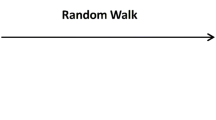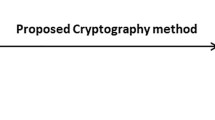Abstract
Securely handling the biometric information of an individual is still a major challenge in many applications. For this reason, many cancelable techniques are present which were proposed with an aim to provide security, but adversarial attacks like a similarity-based attack on popular methods have recently been reported in the literature. In this paper, we propose a random walk-based method for cancelable template generation (2-d random walk and circular random walk). The novelty of the proposed method is to generate a secure, distinct cancelable template from fingerprint data. Further, the proposed scheme is immune to different security attacks. It also ensures the randomness of the generated cancelable templates. Our proposed scheme achieves comparable performance in terms of average genuine acceptance rate of \(97.02 \%\), average false acceptance rate of \(0.13 \%\) for different fingerprint data. Moreover, our proposed scheme has FAR (attack) of \(11.11\%\), which is very low compared to the state-of-the-art method (such as BioHashing 62.5%).










Similar content being viewed by others
References
Nagar, A.; Nandakumar, K.; Jain, A.K.: Biometric template transformation: a security analysis. In: Media Forensics and Security II, vol. 7541, p. 75410O. International Society for Optics and Photonics (2010)
Sadhya, D.; Raman, B.: Generation of cancelable iris templates via randomized bit sampling. IEEE Trans. Inf. Forensics Secur. 14(11), 2972–2986 (2019)
Teoh, A.B.; Goh, A.; Ngo, D.C.: Random multispace quantization as an analytic mechanism for biohashing of biometric and random identity inputs. IEEE Trans. Pattern Anal. Mach. Intell. 28(12), 1892–1901 (2006)
Sadhya, D.; Singh, S.K.: Providing robust security measures to bloom filter based biometric template protection schemes. Comput. Secur. 67, 59–72 (2017)
Kaur, H.; Khanna, P.: Polycodes: generating cancelable biometric features using polynomial transformation. Multimed. Tools Appl. 79(29), 20729–20752 (2020)
Dong, X.; Jin, Z.; Jin, A.T.B.: A genetic algorithm enabled similarity-based attack on cancellable biometrics. In: 2019 IEEE 10th International Conference on Biometrics Theory, Applications and Systems (BTAS), pp. 1–8. IEEE (2019)
Ratha, N.K.; Connell, J.H.; Bolle, R.M.: Enhancing security and privacy in biometrics-based authentication systems. IBM Syst. J. 40(3), 614–634 (2001)
Jin, Z.; Teoh, A.B.J.; Ong, T.S.; Tee, C.: Fingerprint template protection with minutiae-based bit-string for security and privacy preserving. Expert Syst. Appl. 39(6), 6157–6167 (2012)
Ferrara, M.; Maltoni, D.; Cappelli, R.: Noninvertible minutia cylinder-code representation. IEEE Trans. Inf. Forensics Secur. 7(6), 1727–1737 (2012)
Sandhya, M.; Prasad, M.V.; Chillarige, R.R.: Generating cancellable fingerprint templates based on delaunay triangle feature set construction. IET Biom. 5(2), 131–139 (2016)
Kaur, H.; Khanna, P.: Cancelable features using log-gabor filters for biometric authentication. Multimed. Tools Appl. 76(4), 4673–4694 (2017)
Kaur, H.; Khanna, P.: Random distance method for generating unimodal and multimodal cancelable biometric features. IEEE Trans. Inf. Forensics Secur. 14(3), 709–719 (2018)
Supriya, V.; Manjunatha, R.: Logistic map for cancellable biometrics. In: IOP Conference Series: Materials Science and Engineering, vol. 225, p. 012176. IOP Publishing (2017)
Hsiao, H.I.; Lee, J.: Fingerprint image cryptography based on multiple chaotic systems. Signal Process. 113, 169–181 (2015)
Gueguen, L.; Pesaresi, M.: Multi scale Harris corner detector based on differential morphological decomposition. Pattern Recogn. Lett. 32(14), 1714–1719 (2011)
Lowe, D.G.: Distinctive image features from scale-invariant keypoints. Int. J. Comput. Vis. 60(2), 91–110 (2004)
Robnik-Šikonja, M.; Kononenko, I.: Theoretical and empirical analysis of relieff and rrelieff. Mach. Learn. 53(1), 23–69 (2003)
Yang, W.; Wang, K.; Zuo, W.: Fast neighborhood component analysis. Neurocomputing 83, 31–37 (2012)
Tuytelaars, T.; Mikolajczyk, K.: Local Invariant Feature Detectors: A Survey. Now Publishers Inc (2008)
Bay, H.; Ess, A.; Tuytelaars, T.; Van Gool, L.: Speeded-up robust features (surf). Comput. Vis. Image Underst. 110(3), 346–359 (2008)
Jégou, H.; Douze, M.; Schmid, C.; Pérez, P.: Aggregating local descriptors into a compact image representation. In: 2010 IEEE Computer Society Conference on Computer Vision and Pattern Recognition, pp. 3304–3311. IEEE (2010)
Arandjelovic, R.; Zisserman, A.: All about vlad. In: Proceedings of the IEEE Conference on Computer Vision and Pattern Recognition, pp. 1578–1585 (2013)
Pandey, F.; Dash, P.; Sinha, D.: A random walk-based cancelable biometric template generation. In: Innovations in Computational Intelligence and Computer Vision, pp. 423–429. Springer (2021)
Marsaglia, G.: Diehard test suite. Laste visited 8(01), 2014 (1998). Online: http://www.stat.fsu.edu/pub/diehard/
Pandey, F.; Dash, F.: Randomwalk-Based Methods (2020). https://github.com/priyafav/Randomwalk-based-secure-codeword
Maio, D.; Maltoni, D.; Cappelli, R.; Wayman, J.L.; Jain, A.K.: Fvc2002: second fingerprint verification competition. In: Object Recognition Supported by User Interaction for Service Robots, vol. 3, pp. 811–814. IEEE (2002)
Maio, D.; Maltoni, D.; Cappelli, R.; Wayman, J.L.; Jain, A.K.: Fvc2004: third fingerprint verification competition. In: International Conference on Biometric Authentication, pp. 1–7. Springer (2004)
PolyU, H.: Database ii. 6, 27 (2016)
Pandya, B.; Cosma, G.; Alani, A.A.; Taherkhani, A.; Bharadi, V.; McGinnity, T.: Fingerprint classification using a deep convolutional neural network. In: 2018 4th International Conference on Information Management (ICIM), pp. 86–91. IEEE (2018)
Darlow, L.N.; Rosman, B.: Fingerprint minutiae extraction using deep learning. In: 2017 IEEE International Joint Conference on Biometrics (IJCB), pp. 22–30. IEEE (2017)
Wang, S.; Hu, J.: Design of alignment-free cancelable fingerprint templates via curtailed circular convolution. Pattern Recogn. 47(3), 1321–1329 (2014)
Chen, Y.; Wo, Y.; Xie, R.; Wu, C.; Han, G.: Deep secure quantization: on secure biometric hashing against similarity-based attacks. Signal Process. 154, 314–323 (2019)
Marini, F.; Walczak, B.: Particle swarm optimization (pso). A tutorial. Chemom. Intell. Lab. Syst. 149, 153–165 (2015)
Funding
This study was not funded by any agency.
Author information
Authors and Affiliations
Corresponding author
Ethics declarations
Conflict of interest
The authors declare that they have no conflict of interest.
Ethical Approval
This article does not contain any studies with animals performed by any of the authors.
Rights and permissions
About this article
Cite this article
Pandey, F., Dash, P. & Sinha, D. Attack-Resistant and Efficient Cancelable Codeword Generation Using Random walk-Based Methods. Arab J Sci Eng 47, 2025–2043 (2022). https://doi.org/10.1007/s13369-021-06133-1
Received:
Accepted:
Published:
Issue Date:
DOI: https://doi.org/10.1007/s13369-021-06133-1




